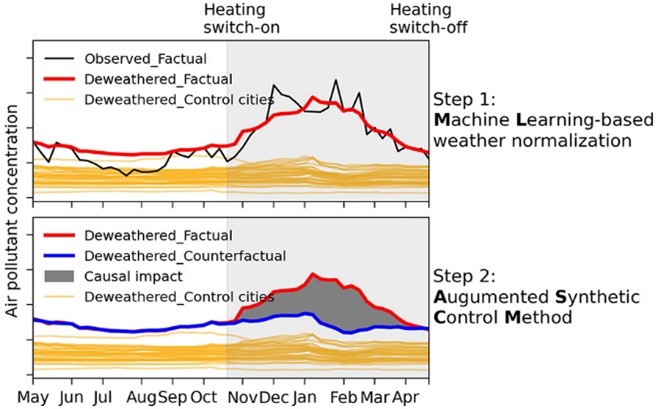In this case study we hear from Bowen Liu, an Assistant Professor in Industrial and Business Economics, who has been making use of BlueBEAR to enable his research into evaluating air pollution control policies around the world.
Understanding the effectiveness of clean air policies is challenging, for example, short-term changes in air quality are dominated by meteorological variations, so changes in emissions may be masked by variations in the weather. There are also other confounding factors such as natural changes in emissions, socio-economic changes, and other interventions, which may also complicate the analysis.

It would take several months if using personal computers, but BlueBEAR is able to help us running ML models in a few days
We applied the two-step interdisciplinary method (ML_ASCM) from computer & atmospheric science (machine learning based weather normalisation technique) and economics (causal inference) and evaluated various air pollution control policies around the world. The BlueBEAR HPC [High Performance Computing cluster] is extremely useful in helping us running Machine Learning (ML) models, especially with large scale data sets e.g. 5-10 years of hourly frequency of 6 pollutants, matched with over 10 meteorological variables for over 100 air quality monitoring sites across the UK, and over 180 cities across China.

Source: Song et al (2023)
It would take several months if using personal computers, but BlueBEAR is able to help us to run ML models in a few days, which greatly improves the efficiency of our analysis. Our work has been published in leading environmental journals (Clean Winter Heating policy in China) and economics journals (Birmingham Clean Air Zone).
References:
Song, C., Liu, B., Cheng, K., Cole, M. A., Dai, Q., Elliott, R. J., & Shi, Z. (2023). Attribution of Air Quality Benefits to Clean Winter Heating Policies in China: Combining Machine Learning with Causal Inference. Environmental Science & Technology.
We were so pleased to hear of how Bowen was able to make use of what is on offer from Advanced Research Computing, particularly to hear of how he has made use of BlueBEAR HPC and its GPU cores – if you have any examples of how it has helped your research then do get in contact with us at bearinfo@contacts.bham.ac.uk. We are always looking for good examples of use of High Performance Computing to nominate for HPC Wire Awards – see our recent winners for more details.
